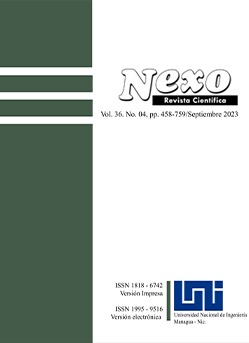Thermo-hydraulic design of a horizontal shell and tube heat exchanger for ethanol condensation
DOI:
https://doi.org/10.5377/nexo.v36i04.16770Keywords:
Design, Ethanol condensation, Shell and tube heat exchanger, Pressure drop, Heat transfer areaAbstract
Horizontal shell and tube condensers are widely used in several industrial applications due to its versatility and heat transfer efficacy. In the present work, the thermo-hydraulic design of a horizontal shell and tube heat exchanger intended to condense 25,000 kg/h of a pure ethanol stream was carried out. Several key design parameters were calculated such as the number of tubes, heat transfer area, overall heat transfer coefficient, shell internal diameter, baffle spacing, as well as the pressure drop for both streams. The heat exchanger type is of pull-through floating head, and will present a number of tubes of 731, a heat transfer area of 223.68 m2, an overall heat transfer coefficient of 499.36 W/m2.ºC, a shell internal diameter of 1.684 m and a baffle spacing of 0.674 m. Around 157 kg/s of chilled water will be required for this heat transfer service. The values of both the shell side (10,069.25 Pa) and tube side (42,192.63 Pa) pressure drop are below the maximum values set by the process.
Downloads
Downloads
Published
How to Cite
Issue
Section
License
Copyright (c) 2023 Array

This work is licensed under a Creative Commons Attribution 4.0 International License.
The authors who publish in Nexo Scientific Journal agree to the following terms:
- Authors retain the copyright and grant the journal the right of the first publication under the license Creative Commons Attribution License https://creativecommons.org/licenses/by/3.0/, which allows others to share the work with a recognition of the authorship of the work and the initial publication in Nexo Scientific Journal.
- Authors may separately establish additional agreements for the non-exclusive distribution of the version of the work published in the journal (for example, in an institutional repository or a book), with the recognition of the initial publication in Nexo Scientific Journal.
- Authors are allowed and encouraged to disseminate their works electronically (for example, in institutional repositories or in their own website) before and during the submission process, as it can lead to productive exchanges, as well as earlier and greater citation of published works.











